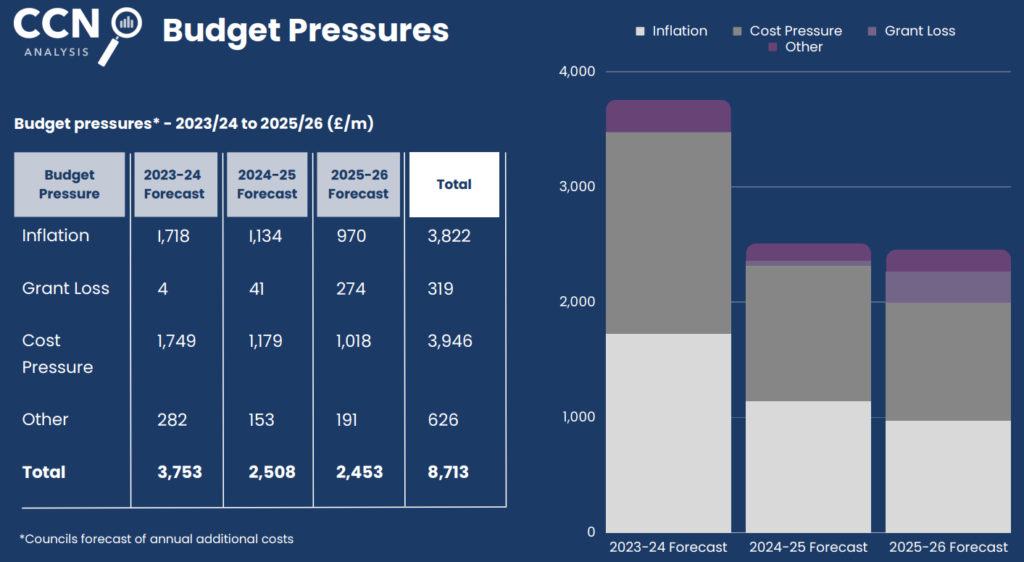England’s largest councils are ‘running out of road’ to prevent financial insolvency as they face overspending their budgets by £603m this year.
New analysis from the County Councils Network (CCN) and Society of County Treasurers (SCT) shows that these overspends are contributing to a projected total funding deficit of £4bn for the 41 county council and unitary authorities across the SCT membership over the three years to 2026.
Combined with future funding shortfalls, these overspends mean that one in 10 of these councils are ‘unsure’ or ‘not confident’ they can balance their budget this year. This figure increases to four in 10 next year and six in 10 by 2025.
This is despite councils planning to make over £2bn worth of ‘challenging’ savings and service cuts over the three-year period to prevent issuing section 114 notices, the CCN and SCT said.
The figures are based on a budget survey conducted by the two organisations in September 2023, which received 31 responses. Revenue outturn data was used to uprate total respondent figures to total figures, providing an estimate for all 41 councils.

A combination of “stubbornly high inflation, rising demand and ‘broken’ provider markets for children in care” are leading to the “historically high” overspends, the CCN and SCT said.
While all council frontline services are experiencing higher than expected costs, increasing demand and an “acute” rise in the costs of placing children in care mean in-year spending on children’s services is “spiralling out of control”, they said, with almost half (45%, £319m) of the projected £639m overspend attributable to this service.
The CCN is calling for emergency funding for children’s services this year and next “to prevent having to undertake drastic spending reductions to other services and reduce their reserves to ‘unsustainable levels’.”
The survey also revealed that councils’ total cost pressures this year top £3.7bn from a combination of higher-than-expected inflation and demand, with local authorities now forecasting that they will overspend their budgets in 2023/24 by £639m – an average of £16m per council.
After children’s services, adult social care (25%, £179m); education, transport – including home to school transport – and highways (22%, £154m); and housing (3%, £24m) make up the bulk of the remaining additional in-year pressure.
Overspends and cost pressures have worsened an already challenging financial outlook, the CCN and SCT said. This year, the funding gap for the 41 councils has grown to £1.6bn, with a further shortfall of £1.1bn in 2024/25 and £1.3bn in 2025/26 according to the survey. This amounts to a total funding shortfall of £4bn between 2023-2026, as noted.
Over recent weeks several county authorities have delivered warnings over their in-year financial position, based on Q1 2023/24 projections. Derbyshire County Council is on course to overspend its budget by £46m; Shropshire Council by £37.6m; Suffolk County Council by £22m; and Hertfordshire County Council by £16.4m.

In issuing the results of the survey, the CCN has stated that unless the government steps in and provides emergency funding, “councils will need to make dramatic cuts to services both this year and next to balance the books to prevent their authorities running out of reserves and becoming insolvent”.
Barry Lewis, CCN vice chair and finance spokesperson, commented: “This analysis lays bare the financial challenge facing county authorities. Historic in-year pressures are worsening an already bleak financial outlook, meaning our councils are facing down the barrel of a £4bn funding black hole.
“The majority of the £639m of additional and unexpected spending this year is simply outside of councils’ control. The number of vulnerable children requiring care has risen dramatically post-pandemic, while inflation and a broken provider market in statutory care placements mean councils face no choice but to pay spiralling fees.
“County authorities will do all they can to bring down costs over the coming period and have pencilled in £2bn of unprecedented further savings to help balance the books. But after a decade of continuous cutbacks, the scale of reductions and use of reserves needed to fill the funding shortfall is simply unsustainable.
“Last year the chancellor stepped in with much needed additional resources for adult social care. We now need the same priority to be given to vulnerable children, providing emergency funding this year and next.
“Birmingham’s recent financial difficulties and issuing of a section 114 were undoubted made worse by the council’s performance and governance. But, unless we act now, this analysis shows that other well managed councils are running out of road to prevent insolvency.”
—————
FREE weekly newsletters
Subscribe to Room151 Newsletters
Follow us on LinkedIn
Follow us here
Monthly Online Treasury Briefing
Sign up here with a .gov.uk email address
Room151 Webinars
Visit the Room151 channel












